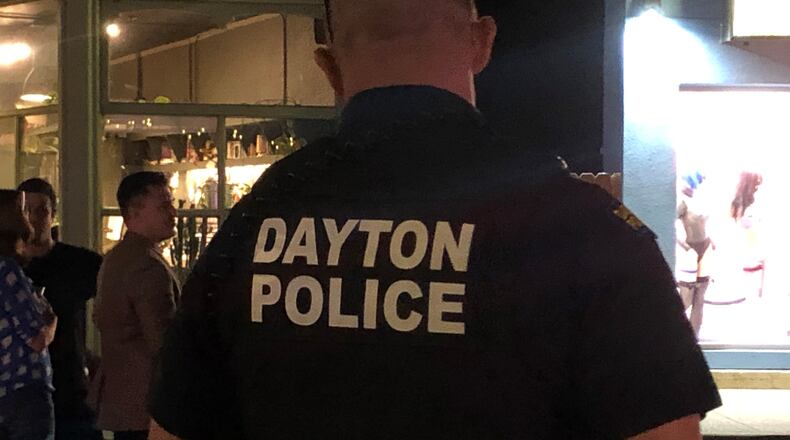Most of Dayton’s 142 police reform recommendations are in the process of being implemented, but city staff say the reform work is far from finished and half a dozen new committees will be formed to provide long-term accountability.
Some people involved in developing the recommendations say Dayton needs to make a serious long-term commitment to police reforms because law enforcement’s issues run deep and real change won’t happen overnight.
David Greer, a member of the community engagement reform group and an implementation group, said the new committees are a good next step if the process is as inclusive as proposed.
“I have been on many committees throughout the years and this inclusiveness of community members throughout has been the best to date,” he said.
But Niki Van Kirk, a member of the use-of-force and implementation committees, said she thought things were starting to get better in Dayton because of police reforms, but she was recently “horrified” to see video of Dayton police dragging a paraplegic man out of his car.
“Now the police are working to somehow justify their actions,” she said. “I feel like I wasted the last year and a half of my life working on police reform.”
Following racial justice protests last year, the Dayton City Commission created five police reform working groups consisting of more than 100 community members that met for months to study, evaluate and issue recommendations about police oversight, training, recruitment, community engagement and use-of-force.
Of the 142 recommendations the groups produced, about 34 are complete, 16 are complete and ongoing and 43 are in progress, according to the Dayton Police Department.
Remaining recommendations include some that are pending pre-requisites (20% of total), involve another partner or city department (9%) or have a delayed ruling (4%), the city said.
Later this month, a group of community members that has been monitoring how the city implements the reform recommendations are expected to meet for the final time.
But police reform work is going to continue for a long time to come, said Will Smith, an engagement coordinator the city hired to assist with the police reform process.
Dayton plans to create a “long-term accountability” structure consisting of new committees focused on police policy, training, community engagement, recruitment and use of force, said Torey Hollingsworth, director of the office of the Dayton City Commission.
A sixth group will be a new Community Appeals Board. The six groups essentially will replace the existing Community Police Council, which will be dissolved.
Instead of having one group try to address issues impacting police-community relations, each of the six groups will have specific focus areas, officials said.
The groups are expected to be created over the next several months, and their first meetings are likely to be held in early 2022.
The city developed the six committees after hearing feedback from working group members and other stakeholders, including the Community Police Council, Hollingsworth said.
The appeals board and the use-of-force committee will be appointed by the Dayton City Commission and will serve important oversight and policy-making roles, she said.
These will be public bodies that hold public meetings, while the other four committees are not expected to be public bodies.
The use-of-force group will meet quarterly and will have seven to nine members, as well as staff from a new independent accountability auditor.
The committee will review quarterly updates about use-of-force incidents and help prepare an annual use-of-force report that will be presented to city leaders. The group also will be able to make policy recommendations.
The Community Appeals Board will meet monthly and will have seven members, including at least one veteran police officer, one member of an organization dedicated to minority rights and one member of a group dedicated to immigrant rights.
The board will hear appeals by citizens who filed complaints against police and who disagree with the outcomes of their cases.
The board, which replaces the existing Citizens’ Appeals Board, also will receive quarterly briefings from the Professional Standards Bureau, formerly internal affairs, and will be allowed to review policies, procedures, and recommendations.
New policy and training committees will meet quarterly and will have seven to nine members who receive updates and provide feedback on policy or recruitment and ongoing training.
The recruitment committee will focus on building relationships, particularly with the Black community, and will try to identify and remove barriers to recruiting diverse police candidates, Hollingsworth said.
The committee also will assist with implementing recruiting strategies and provide feedback on marketing materials and channels.
The community engagement committee could meet monthly and should include community members with extensive relationships, officials said.
It’s also important that young people be represented on the committee, said Maddie White, a member of the police reform implementation group.
“The community engagement group will assess the existing modes of communication to ensure that there is broad, comprehensive communication about police activities and operations,” she said.
The proposed committees are a good step forward because police reform needs to be an ongoing process, said Van Kirk, who serves on the implementation committee.
But she said she is concerned about the way the groups are being formed and she thinks small groups are working behind the scenes to make important decisions.
“It seems like the police and the city have taken control away from the people,” she said.
Van Kirk also said she was deeply disturbed by recent video of Dayton officers pulling a paraplegic man from his vehicle. She said she worries the police reform efforts aren’t leading to meaningful changes.
About the Author




